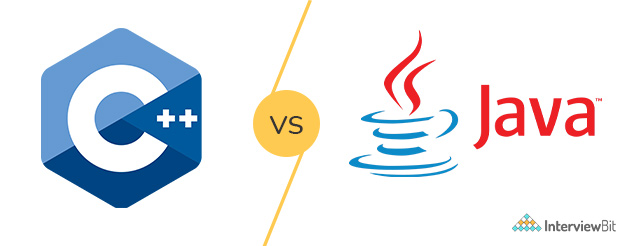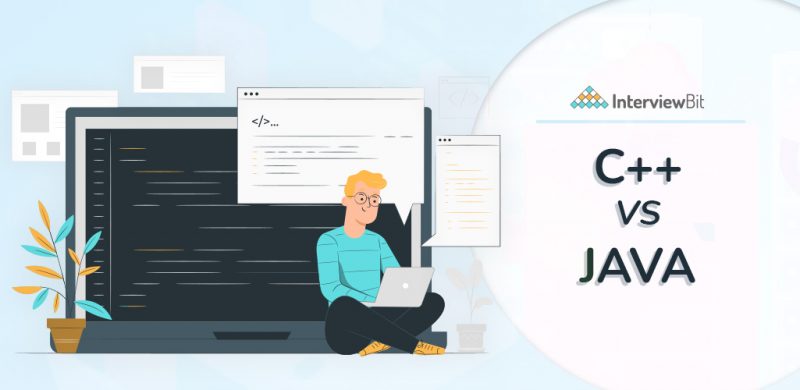- Introduction to C++
- Introduction to Java
- Differences Between C++ and Java
- Conclusion
- Frequently Asked Questions
- Q.1: Is it better to learn C++ or Java?
- Q.2: Is C++ more powerful than Java?
- Q.3: Why is C++ used?
- Q.4: Is C++ a dying language?
- Q.5: Which is better for beginners? C++ or Java?
- Q.6: What is the main key difference between C++ and Java?
- Additional Resources
Introduction to C++
One of the most popular programming languages in a variety of fields like Game engines, high-frequency trading, etc. is C++. It is a semi-object-oriented programming language which was developed by Bjarne Stroustrup as an extension of the already existing programming language C. C++, also popularly known as ‘C with classes’, has evolved and diversified a lot over the course of time and is implemented as a compiled language. C++ has found its usage in a lot of big Software Companies like Microsoft, IBM, etcetera and can be used to develop desktop applications, video games, servers for instance, E-Commerce, web search and databases, and high-performance applications for instance, telephone switches, space probes, etc.
C++ has support for a lot of features like object-oriented principles, for instance, Inheritance, Encapsulation, Polymorphism (both static and dynamic), etcetera. But C++ code can be compiled even without having classes or creating objects. Hence, it is rightly termed as a semi-object-oriented language.
Some of the features that C++ has to offer are as follows:
Confused about your next job?
1. Static and Dynamic Memory allocation: In C++, both static and dynamic allocation is possible. This means that C++ allows the users to allocate memory to variables, objects, etc., both at compile time(static memory allocation) and at run time (dynamic memory allocation). Dynamic memory allocation can be achieved with the usage of malloc(), calloc(), realloc(), etc. functions.
2. Creation of Templates: C++ templates are used to enforce generic programming. Essentially, templating means creating a generic function, class, etc. that would perform a particular task for more than one data type.
3. Operator Overloading: C++ has support for operator overloading, that is, giving a meaning to a particular operator other than what it is usually used for. For instance, the addition operator (‘+’) of C++ is generally used to add two numbers, be it integer or fractional values. However, it can be overloaded to concatenate two strings or add two Complex Number objects also.
4. Lambda Functions: There is support provided by C++ for anonymous functions, popularly called lambda expressions. The syntax of lambda functions is given below:
| [capture](parameters) -> return_type { function_body } |
5. Exception Handling: In order to debug any type of error and also to make code tamper-free, C++ provides support for exception handling through the use of the ‘try’, ‘catch’, ‘final’, etc. keywords.
Introduction to Java
Originally developed by James Gosling at Sun Microsystems (now acquired by Oracle), Java is one of the most diverse languages of today’s time. Used by hundreds of Software Companies and millions of developers all around the globe, Java has become the most popular language which is used to build software applications to solve real-world problems. Java is a high-level object-oriented programming language which is designed to have as few implementation dependencies as possible. Java supports the feature of WORA – Write Once Read Anywhere. In other words, compiled Java code can run on all platforms that support Java without the need for recompilation.
Java also has support for a lot of features which enhances a developer’s capabilities to develop scalable applications. Special classes like Applets, Servlets, JavaServer Pages, etc. make the development of applications easier. Also, Java has a lot of frameworks built on top of it like Spring, Dagger etc. which helps developers to work seamlessly.
Now that we know about what CPP and Java are, let us deep dive into the difference between the two languages, that is, let us take a look at C++ Vs Java in terms of various attributes.
Differences Between C++ and Java

The major differences between C++ and Java have been summarised in the following table:
| INDEX | COMPARISON PARAMETER | C++ | JAVA |
| 1 | Developed / Founded by | C++ was developed by Bjarne Stroustrup at Bell Labs in 1979. It was developed as an extension of the C language. | Java was developed by James Gosling at Sun Microsystems. Now, it is owned by Oracle. |
| 2 | Programming model | It has support for both procedural programming and object-oriented programming. | Java has support only for object-oriented programming models. |
| 3 | Platform dependence | C++ is platform dependent. It is based on the concept of Write Once Compile Anywhere. | Java is platform-independent. It is based on the concept of Write Once Run Anywhere. |
| 4 | Features supported | C++ supports features like operator overloading, Goto statements, structures, pointers, unions, etc. | Java does not support features like operator overloading, Goto statements, structures, pointers, unions, etc. |
| 5 | Compilation and Interpretation | C ++ is only compiled and cannot be interpreted. | Java can be both compiled and interpreted. |
| 6 | Library and Code reusability support | C++ has very limited libraries with low-level functionalities. C++ allows direct calls to native system libraries. | Java, on the other hand, has more diverse libraries with a lot of support for code reusability. In Java, only calls through the Java Native Interface and recently Java Native Access are allowed. |
| 7 | Memory Management | In C++, memory management is manual. | In Java, memory management is System controlled. |
| 8 | Type semantics | C++ is pretty consistent between primitive and object types. | In Java, semantics differs for primitive and object types. |
| 9 | Global Scope | In C++, both global and namespace scopes are supported. | Java has no support for global scope. |
| 10 | Access control and object protection | In C++, a flexible model with constant protection is available. | In Java, the model is cumbersome and encourages weak encapsulation. |
Conclusion
So, in conclusion, we would like to mention that both languages are used by a plethora of big Software Companies and therefore, learning both of them could prove to be extremely useful.
For people looking forward to taking a job in the Software Industry, or already have a Software Engineering Job, it is better to learn more about Java because of the diversity and flexibility it provides. However, for people looking to work on building operating systems, gaming engines, etc. where high performance is needed, C++ can turn out to be a better programming language than Java as it is way faster than Java.
Frequently Asked Questions
Q.1: Is it better to learn C++ or Java?
Answer: For beginners, it is better to learn C++ as the syntax of C++ is easier compared to Java and there is extensive support for standard data structures like stack, queue, etc. in C++. However, for more experienced coders, Java is a great programming language to know about as Java is used in a lot of big companies like Amazon, Google, etc. and therefore, would help the developers a lot.
Q.2: Is C++ more powerful than Java?
Answer: We cannot say that one language is more powerful than the other until the criteria for judgement are mentioned. In other words, in terms of performance, C++ is the winner. However, in terms of flexibility of usage, Java is definitely better.
Q.3: Why is C++ used?
Answer: C++ is a semi-object-oriented programming language which is great for beginners to learn about the basics or fundamentals of object-oriented programming. Also, in areas like Gaming engines and High Frequency Trading, etc. high performance is of utmost importance and hence, C++ is the preferred language in these fields.
Q.4: Is C++ a dying language?
Answer: To a certain extent, the answer to this question is Yes. Java and JavaScript had taken over a few years back and Python seems to dominate the present (and future perhaps). However, we have to also take into consideration the fact that C++ is still amongst the top five most popular languages. The fact that C++ usage is more domain-oriented, does not necessarily mean it is dying.
Q.5: Which is better for beginners? C++ or Java?
Answer: In order to answer this question, one’s interests need to be taken into account. If a beginner wants to make projects on the system side or make projects related to gaming engines, etc. and if making high-performance and fast systems is a priority, C++ is definitely a better choice for those kinds of beginners compared to Java. However, Java offers way more features and easy-to-use libraries than C++ and therefore, is preferred in the domain of Software Development by a lot of developers. So, to build feature-rich applications with ease, a beginner can go ahead and choose Java over C++.
Q.6: What is the main key difference between C++ and Java?
Answer: The main difference between C++ and Java is that C++ is only a compiled language while Java is both compiled and interpreted. The C++ compiler converts the source code into machine code and therefore, it is platform dependent. However, Java source code is converted into bytecode by its compiler and following that, the Java interpreter executes this bytecode at runtime and produces output. The fact that Java is interpreted is the reason why it is platform-independent.




